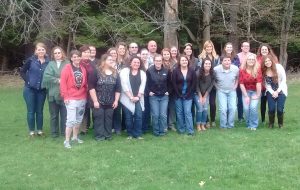Is Social Work For Me?
Social workers help people solve and cope with problems in their everyday lives. Our students go on to work in community mental health centers, hospitals, child and family service agencies, schools, hospice programs, child welfare programs, adoption agencies, homeless centers, and substance abuse treatment services. At the University of Maine School of Social Work, students learn not just from books but from experienced social work practitioners and from their own supervised social work experiences.To explore the world of social work and a career in social work, the National Association of Social Workers has a comprehensive website about our profession. The “Help starts here” webpage provides excellent information about social work in many areas – work with children, health and mental health, work with seniors — to name just a few of the topics. It’s also important to review the social work code of ethics. As professional social workers you will be expected to follow the National Association of Social Workers Code of Ethics (PDF) in your practice and as a student.
experienced social work practitioners and from their own supervised social work experiences.To explore the world of social work and a career in social work, the National Association of Social Workers has a comprehensive website about our profession. The “Help starts here” webpage provides excellent information about social work in many areas – work with children, health and mental health, work with seniors — to name just a few of the topics. It’s also important to review the social work code of ethics. As professional social workers you will be expected to follow the National Association of Social Workers Code of Ethics (PDF) in your practice and as a student.
Only you can truly make the decision about whether you have what it takes to be a social worker and whether it is something you want to do. The social work profession is suited to people who are flexible, socially and politically aware, self-motivated, eager to learn over a lifetime, desirous of personal growth, altruistic, comfortable with ambiguity, and interested in changing social conditions that are adverse to healthy human development, self-determination and social justice.For some real life stories from social workers and a to take a brief quiz about what kind of social worker you might be, please go to Be A Social Worker. We encourage you to consider these areas before deciding if social work is the right career for you.
What is Social Work?

If you want a career with meaning, action, diversity, satisfaction, and an abundance of options, social work is for you! Social workers are skilled professionals who work to empower individuals, relieve suffering, and affect social change. They are generalists and specialist who work in a wide variety of settings but apply common core values, principles, and techniques. For sheer variety, few occupations can match social work and the broad range of opportunities and settings it offers. Social workers work in mental health and healthcare, in child welfare and aging, in management and in clinical settings. They work in hospitals, schools businesses, public agencies, police departments, private practices, and many other interesting workplaces. They are mangers, therapists, community organizers, educators, and researchers. They are on the front lines and behind the scenes. They are in large cities and in small communities. Wherever people are, social workers are. [From: National Association of Social Workers (2006). Choices: Careers in Social Work. Pg 2-3].
Social work is a distinctive profession that shares a commitment not only to work with individuals, families and small groups but also a commitment to institutional and societal change. As a profession, social workers maintain a primary commitment to disadvantaged, vulnerable, and economically deprived persons in our society. Social workers help people in dealing with relationships, solving problems and coping with the many social and environmental concerns which affect and control daily life. Historically, social workers led the fight for child labor laws, voting rights for women, and other progressive milestones. Social workers share a common set of professional values and ethics, and common set of basic or generic skills that enable them to work with diverse populations and fill diverse roles in a variety of settings.
How do I know if I’m suited to being a social worker?
Only you can truly make the decision about whether you have what it takes to be a social worker and whether it is something you want to do. The social work profession is suited to people who are flexible, socially and politically aware, self-motivated, eager to learn over a life time, desirous of personal growth, altruistic, comfortable with ambiguity, and interested in changing social conditions that are adverse to healthy human development, self-determination and social justice.
